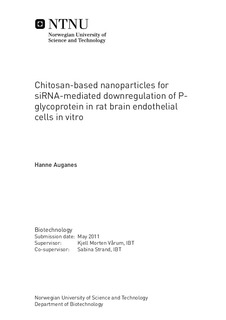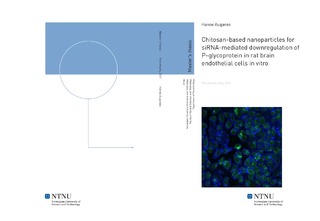| dc.contributor.advisor | Vårum, Kjell Morten | nb_NO |
| dc.contributor.advisor | Strand, Sabina | nb_NO |
| dc.contributor.author | Auganes, Hanne | nb_NO |
| dc.date.accessioned | 2014-12-19T13:14:27Z | |
| dc.date.available | 2014-12-19T13:14:27Z | |
| dc.date.created | 2011-06-16 | nb_NO |
| dc.date.issued | 2011 | nb_NO |
| dc.identifier | 423813 | nb_NO |
| dc.identifier | ntnudaim:6541 | nb_NO |
| dc.identifier.uri | http://hdl.handle.net/11250/245680 | |
| dc.description.abstract | Chitosans are cationic polymers desirable for use in nucleic acid delivery due to its biocompability, biodegradable and low toxic nature. The P-glycoprotein (P-gp) pump is a member of membrane transporters in brain endothelial cells which recognizes xenobiotics, extruding them from the cells. P-gp is a highly clinically relevant target as it also limits accessibility of drugs from the blood to the brain.The overall aim of this work was to investigate the feasibility of using chitosan as a delivery vehicle for siRNA-mediated knockdown of P-glycoprotein (P-gp) efflux pump in an in vitro model of blood brain barrier. The human lung cancer cells (H1299) stably expressing GFP was used for screening and optimization of the delivery system and conditions. Lung cancer is often represented among multidrug resistant cell lines and is therefore also a suitable target for knockdown of transporters. The main objective was to implement this knowledge to efficiently downregulate the P-gp pump residing in the rat brain endothelial cell line RBE4. The approach was to first establish suitable physiochemical characteristics of the chitosans like DPn and the N/P ratios of chitosan/siRNA complexes by studying exogenous GFP and endogenous GAPDH expression and uptake of fluorescently labeled siRNA by flow cytometry. Cytotoxicity profiling of the chitosans and polyplexes was preformed with AlamarBlue, PI-staining, Cell counting and BCA assay. We further investigated the effect of chitosan mediated mdr1a-siRNA on drug efflux in the RBE4 cells using two functional assays; Rhodamine 123 efflux by flow cytometry and visualization of the anticancer drug Doxorubicin by CLSM.We demonstrated that chitosan can be used as an efficent delivery vehicle for siRNA in both H1299 and RBE4 cells with negligible cytotoxicity in vitro. The formulated chitosan/siRNA polyplexes was found to dependent on DPn and N/P ratios in order to exert maximal effect on both uptake and knockdown. Specifically, we managed to downregulate the P-gp expression in RBE4 cells using chitosans with a high DPn complexed with mdr1a-siRNA in a low N/P ratio. Together these results elucidate the potential of chitosan mediated siRNA downregulation of the P-gp pump in RBE4 cells and further development for in vivo applications. | nb_NO |
| dc.language | eng | nb_NO |
| dc.publisher | Institutt for bioteknologi | nb_NO |
| dc.subject | ntnudaim:6541 | no_NO |
| dc.subject | MBIOT5 Bioteknologi | no_NO |
| dc.subject | Molekylærbiologi | no_NO |
| dc.title | Chitosan-based nanoparticles for siRNA-mediated downregulation of P-glycoprotein in rat brain endothelial cells in vitro | nb_NO |
| dc.type | Master thesis | nb_NO |
| dc.source.pagenumber | 118 | nb_NO |
| dc.contributor.department | Norges teknisk-naturvitenskapelige universitet, Fakultet for naturvitenskap og teknologi, Institutt for bioteknologi | nb_NO |

